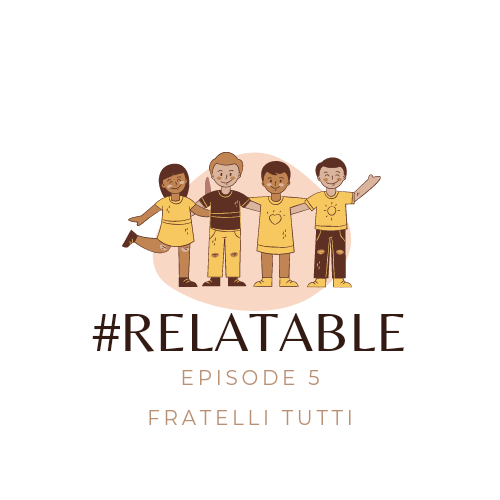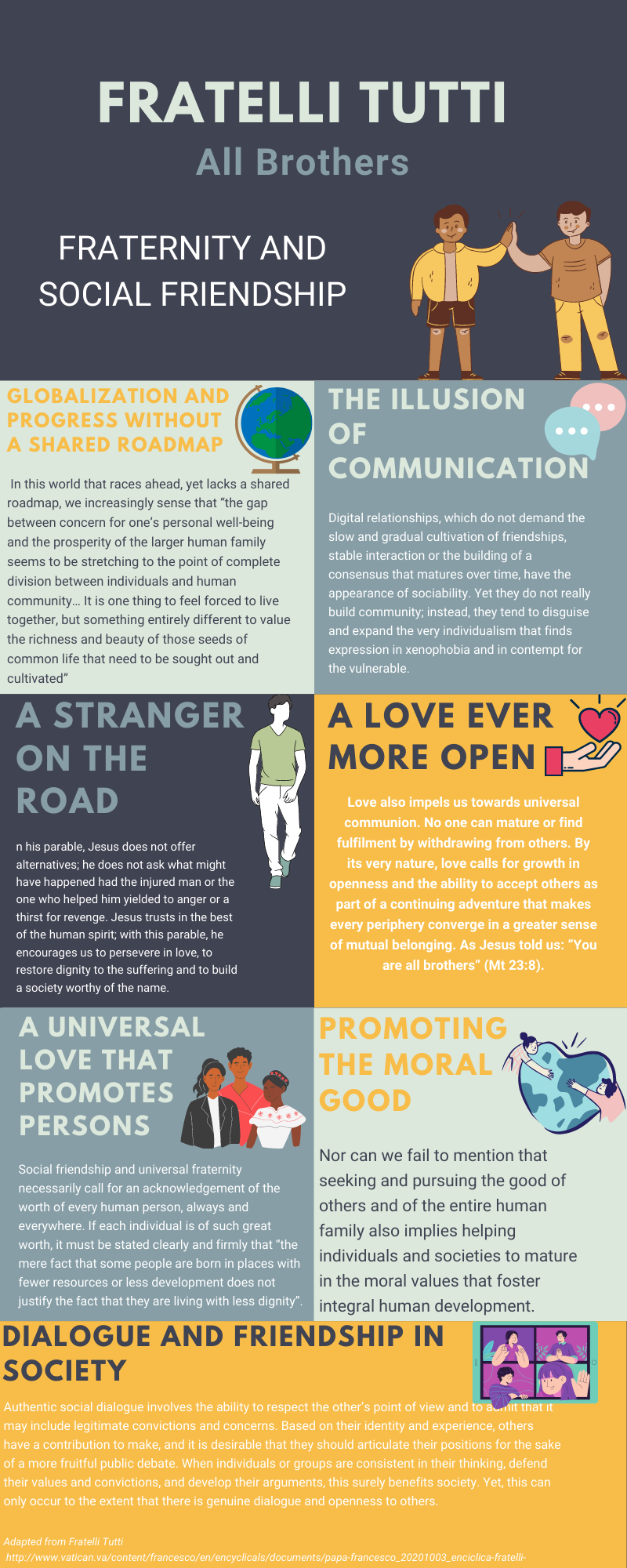#relatable Ep5: Fratelli Tutti
- Jun 20, 2021
- 4 min read
Updated: Aug 20, 2021
This is part of a 8-part series where I take a closer look at Vatican documents and distill some gems that you can take with you on your own journey to knowing and loving Him.

Recently I was privileged to help facilitate some discussion sessions on an ecumenical conference on Fratelli Tutti
It is my desire that, in this our time, by acknowledging the dignity of each human person, we can contribute to the rebirth of a universal aspiration to fraternity. Fraternity between all men and women. “Here we have a splendid secret that shows us how to dream and to turn our life into a wonderful adventure. No one can face life in isolation… We need a community that supports and helps us, in which we can help one another to keep looking ahead. How important it is to dream together… By ourselves, we risk seeing mirages, things that are not there. Dreams, on the other hand, are built together”
In a fragmented and divided world, the call to a universal brotherhood, a fraternity is ever more clear. As a global society, we tend to focus on what divides instead of what unites us, we see race, language, religion as areas of division and differentiation when truly to address the problems we face collectively, we will need a universal outlook. The timeliness of Pope Francis' message reminds me of the enduring value of the message of the gospel.
I will focus on 3 key areas which touched me deeply and which you may consider for reflection too!
The illusion of communication
Digital relationships, which do not demand the slow and gradual cultivation of friendships, stable interaction or the building of a consensus that matures over time, have the appearance of sociability. Yet they do not really build community; instead, they tend to disguise and expand the very individualism that finds expression in xenophobia and in contempt for the vulnerable. Digital connectivity is not enough to build bridges. It is not capable of uniting humanity.
The allure of the plethora of communication platforms we use today does not guarantee genuine connection. Instead, individualism is rife and we have struggled to build a real sense of community. This has been exacerbated by our relative isolation in these times and dependence on online platforms to connect with others. The cloak of anonymity allows mistrust to fester between different groups of people which can result in aggression. Digital platforms have the potential to both unite disparate groups of people but also to divide them, as evident from the vitriol that follows heated debate. While we have greater access to information, we are unable to make sense of this information to make better decisions and there is an absence of a shared wisdom.
2. A stranger on the road
But a Samaritan while traveling came near him; and when he saw him, he was moved with pity. He went to him and bandaged his wounds, having poured oil and wine on them. Then he put him on his own animal, brought him to an inn, and took care of him. The next day he took out two denarii, gave them to the innkeeper, and said, ‘Take care of him; and when I come back, I will repay you whatever more you spend.’ Which of these three, do you think, was a neighbour to the man who fell into the hands of the robbers?” He said, ‘The one who showed him mercy.’ Jesus said to him, ‘Go and do likewise.’”(Lk 10:25-37).
The parable of the Good Samaritan is familiar with many - yet I glimpsed its deep significance in the context of a divided world. We are deaf to the needs of the people around us, especially those with which we bear no connection. We are focussed on our own individual needs and turn a blind eye and deaf ear to the needs of the suffering. It shows in our attitude towards migrants and minorities. It shows in our armchair brand of charity, preferring to remain ensconced in our protective bubble of privilege instead of lending a helping hand to the stranger on the road. The stranger on the road is a powerful metaphor for the unseen opportunity to put charity into practice - the person who needs us. The story itself allows us to inhabit the main characters in the parable, from the robbers who choose to cheat and manipulate, to the injured man himself, helpless to the passersby who hurry along instead of getting involved.
3. Envisaging and engendering an open world
In the depths of every heart, love creates bonds and expands existence, for it draws people out of themselves and towards others.[65] Since we were made for love, in each one of us “a law of ekstasis” seems to operate: “the lover ‘goes outside’ the self to find a fuller existence in another”.[66] For this reason, “man always has to take up the challenge of moving beyond himself”
We realise our inherent connectedness and dependence on one another and the message is clear - to love and create bonds. This can prove difficult given the increasingly closed nature of society - yet the challenge is to keep our hearts and minds open to our brothers and sisters, in the spirit of the fraternal love that St Francis espouses.
Love also impels us towards universal communion. No one can mature or find fulfilment by withdrawing from others. By its very nature, love calls for growth in openness and the ability to accept others as part of a continuing adventure that makes every periphery converge in a greater sense of mutual belonging. As Jesus told us: “You are all brothers” (Mt 23:8).
There is much wisdom to be gleaned from the document and I have only just scratched the surface. I attach a simple Infographic I created that summarises some key points that you might find useful too as you read the document in greater detail, and with prayerfulness.

Here is a link to the document in full: http://www.vatican.va/content/francesco/en/encyclicals/documents/papa-francesco_20201003_enciclica-fratelli-tutti.html
Thank you for coming on this journey with me as we delve deeper into the wisdom of these documents as we start to learn how truly it is #relatable!



Comments